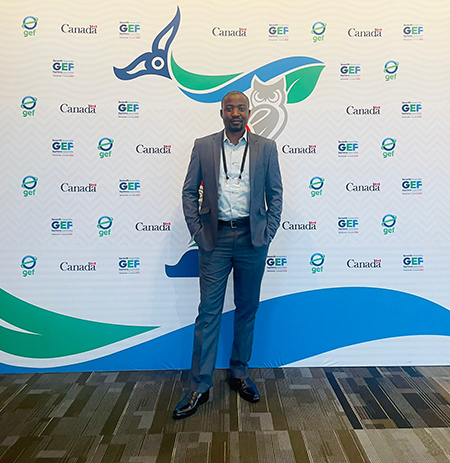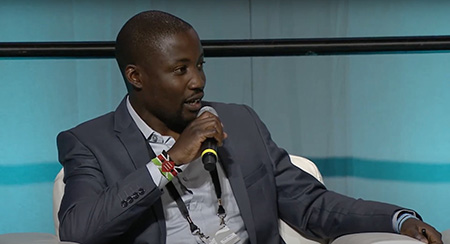Campus News
Alumnus Kevin Lunzalu wins major award for his work in plastics pollution reduction around the world
UCSC alumnus Kevin Lunzalu received an award from the Global Environment Facility (GEF). This award is one of just 23 awarded to individuals and nonprofits across the globe from the first-ever inclusive GEF Assembly Challenge Program.



Kevin Lunzalu (M.S. ’23) has had a whirlwind summer.
Since June, Lunzalu has graduated from UCSC’s Coastal Science and Policy Program as part of the program’s fourth cohort, spoke as the student speaker for his graduating class, returned to his native country, Kenya, to get back to work with his organization the Kenyan Youth Biodiversity Network, and was named one of the 7 New York Academy of Sciences (NYAS) Marine & Oceanography Fellows 2023.
Now, he’s added another milestone to that already impressive list: an award from the Global Environment Facility (GEF).
On August 21, Lunzalu traveled from Kenya to Vancouver, Canada, to accept the award and speak to the larger consortium during the Seventh GEF Assembly. The Assembly was attended by representatives of all 185 member countries. It also featured keynote addresses from Canada’s Minister of Environment and Climate Change, Hon. Steven Guilbeault, and from Canada’s Prime Minister, Hon. Justin Trudeau. This award is one of just 23 awarded to individuals and nonprofits across the globe from the first-ever inclusive GEF Assembly Challenge Program.
For the first time, this year’s awards are working directly with civil society organizations, meaning the funds go directly to the people on the ground doing the work. As such, Lunzalu’s organization received a direct grant of $100,000 to put toward their continued efforts at addressing common environmental challenges through innovative youth solutions.
As exciting as this news is, Lunzalu remains humble and thoughtful about how the last few years—from Kenya to Santa Cruz and back again—have helped him to reach this moment.
In 2017, Lunzalu co-founded the Kenyan Youth Biodiversity Network from his homebase in Busia, which over the years has become one of the country’s largest youth-led conservation organizations. In 2018, he met Abel Mkulama in Nairobi; years later, Mkulama (a 2021 graduate of the CSP program, based in Malawi) reached out to Lunzalu to encourage him to apply for the CSP program.
“He took me through the process, told me about UCSC as an institution, and I was particularly excited that the program is different from other Master’s or graduate programs, because it’s centered on grassroots action and the link between science and policy,” Lunzalu said.
Lunzalu was accepted to start the program in September 2021, and his move to Santa Cruz marked his first time in the United States. He notes that the move—some 9,450 miles from Kenya—was a major shift, but his cohort and the university as a whole made it easier to settle in.
“UCSC is generally welcoming, and my cohort was 10 people—I love my cohort, I miss my cohort so much,” he said. “They would invite me for Thanksgiving with their families, my landlords would give me a bike to move around, take me to the movies, share quality time with me, follow up on my progress, cheer me on, and introduce me to new people. I met my project co-advisor, Mr. Dan Brumbaugh, through my landlord! To me, it meant everything that I had met this new family.”
Lunzalu compares the CSP Program Director, Professor Anne Kapuscinski, to a mother figure, helping to make him both comfortable and more confident in his two-year track.
When he started in the program, Lunzalu aimed to learn more about how to create a tool that could help significantly reduce plastics waste ending up in the ocean, particularly in nesting zones of key species, namely endangered sea turtles. This has been a tremendous problem in his native country, leading to a “pollution crisis” in the Indian Ocean, and Lunzalu wanted to find a solution.
“The CSP program is designed in a way that students come in with their ideas for solving a coastal problem, but they are taken through a very thorough process of fine-tuning these ideas, making them more practical and more efficient,” he said.
As such, Lunzalu worked diligently with Kapuscinski and his faculty advisors, Katherine Seto and Dan Brumbaugh, to refine his ideas and finalize a capstone project to conduct in his second year. For his capstone, Lunzalu looked at informing policies on a national and local level to lead to a significant reduction of plastics. He also worked with his vast network and the Kenyan Youth Biodiversity Network to mobilize beach management and routine cleanups, all while creating a growing marine debris database to characterize plastics pollution on the beaches themselves.
“We can now use this data on ocean plastics to engage policymakers, show them what shows up on the beach, and identify potential sources of the plastic waste to give us an idea of where to focus efforts to reduce plastic pollution at its source,” he said.
With the assistance of Kapuscinski, Lunzalu connected with the Wildlife Conservation Network (WCN) and the Monterey Bay Aquarium, both on his capstone project and in continuing conversations related back to his work in Kenya.
Kapuscinski remembers when she first interacted with Lunzalu—during the second round of interviews for the CSP program—that he was an incredibly effective communicator, very engaging, and already a clear leader. Those elements have furthered in their time together and his recent award illustrates his future influence on the global stage.
“I would always help to spread the word about what Kevin was doing,” she said.
As she notes, Lunzalu has received a number of awards since starting at UCSC. The addition of GEF is no surprise.
“I imagine him becoming a really major national leader,” she said. “He’s going to keep moving forward on getting more of our decision makers to not only accept, but actually act at the nexus of climate action and biodiversity conservation.”
For now, Lunzalu is dedicated to the Kenyan Youth Biodiversity Network and seeing how much further he can grow this network with other organizations. With the GEF funding, Lunzalu will work with other youth organizations from six other countries as part of a biodiversity alliance.
As Lunzalu says, awards like the GEF further emphasize just how important this work is.
“While ocean challenges are mostly complex and context-specific, the global nature of associated risks and impacts should be a reason enough for all of us to work as one, and with a greater sense of urgency for once,” he said.